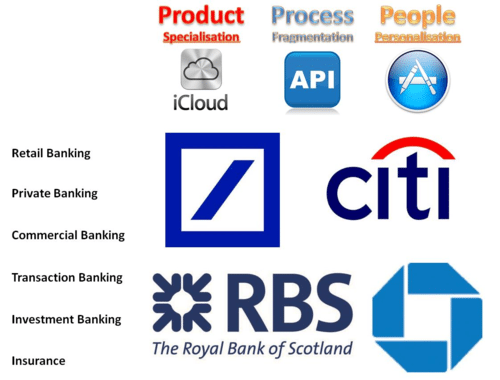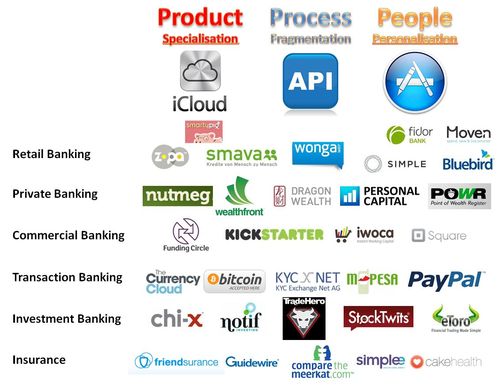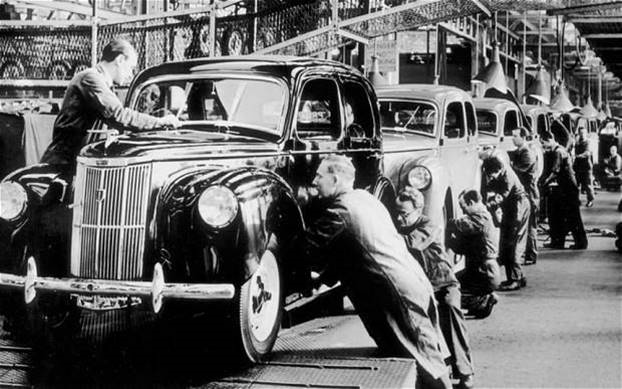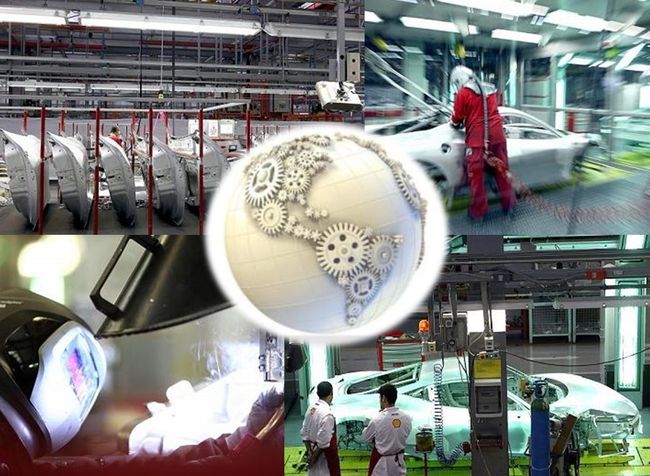
For the past three blog entries, I have tried to convey how the old world of products, processes and people - or manufacturing, operations and distribution if you prefer - is being re-engineered by technologies.
Cloud-based products and services can deliver the bank products anywhere, anytime; open source processing via APIs allow those cloud-based products to be integrated into anyone's front-end delivery; and the front-end distribution is now through the best app.
We can now see that the whole end-to-end production, processing and distribution of finance is being changed by this new technology capability.
OLD WORLD

NEW WORLD

Banks no longer need to produce, process and distribute the financial capabilities end-to-end.
Instead they can just take pieces of the product, process and distribution map, and leverage that map to suit their needs.
A bank can take a Zopa and Funding Circle back-end and a Simple front-end and purely offer the payment process to link the two (this is actually what PayPal does).
A retailer can take their product (coffee) and distribution (stores) and link them through a payment process (payments) to make their service better.
That is what Starbucks did when it partnered with Square.
It's a different world that banks have not worked out yet, because banks want to keep the map to themselves.
Most big banks believe they have to be responsible for everything across all parts of the map.
They have to manufacture, process and deliver all financial products and services in all markets: retail, commercial and investment banking.
That model was broken years ago and is haemorrhaging today, as more and more players nibble at the pieces of the map.
The new players specialise in each area and do it better.
As a result, they gain traction through specialisation.
- Can a Deutsche Bank or Citigroup really manage FX better than Currency Cloud?
- Can a wealth management firm really deliver the allocation of funds better than Nutmeg?
- Can a trader really outperform the best traders on etoro (especially if they haven't even bothered to look at them)?
- Can a bank truly develop financial management apps that outperform specialists like Simple?
These are the questions the banks need to ask themselves as, if the answer is no, they will need to partner and cooperate with the specialists nibbling at their margins before their margins disappear.
It is very similar to what happened to physical product manufacturing over the years.
Car manufacturers, for example, had to manufacture all the components of their cars, then integrate those components to assemble the car itself, and finally distribute their vehicles through showrooms that only bought and sold their cars, and provided all the service and maintenance too.

Then specialists appeared.
Container ships allowed any components to be manufactured by anyone anywhere, and prices dropped dramatically.
A BMW or Mercedes no longer has unique components manufactured by them, but have common parts sourced globally from specialists who can produce engine manifolds and leather seats far more easily and cheaply than they ever could themselves.

Similarly, BMW and Mercedes may assemble the components and sell them through licensed dealers, but most of the service and maintenance is performed by specialists like autoglass, kwik--fit and dedicated garage shops for MOTs and service.
In other words, the structure of the industry changed fundamentally due to the re-engineering of the physical supply chain allowing specialists to focus and prosper.
That is what is happening in banking today.
Specialists are starting to change the financial map through the re-engineering of the financial supply chain.
What this allows is for anyone with a programmer, an API or an app to develop and deploy, focus and survive, prosper and thrive; and that is why banks must respond and react, assemble and integrate, aggregate and present.
The financial markets have not quite worked this one out, but some are getting there:
- BBVA and Société Générale offering APIs in Open Talent competitions;
- Sberbank and Santander investing in the specialists through a venture capital fund, to ensure they are part of the next generation returns on investment;
- mBank throwing away the old vertically integrated bank model and re-generating the new bank with components from Meniga for transaction searches and Cardlytics for promotions;
- Barclays rapidly moving from stagnation to innovation with Pingit and biometrics (they just launched a voice recognition service);
… and more.
What this means is that the visionary banks are becoming fast moving integrators, assembler and generators of components and capabilities.
Unfortunately, there just aren't that many visionary banks out there doing this (yet).
Chris M Skinner
Chris Skinner is best known as an independent commentator on the financial markets through his blog, TheFinanser.com, as author of the bestselling book Digital Bank, and Chair of the European networking forum the Financial Services Club. He has been voted one of the most influential people in banking by The Financial Brand (as well as one of the best blogs), a FinTech Titan (Next Bank), one of the Fintech Leaders you need to follow (City AM, Deluxe and Jax Finance), as well as one of the Top 40 most influential people in financial technology by the Wall Street Journal's Financial News. To learn more click here...

